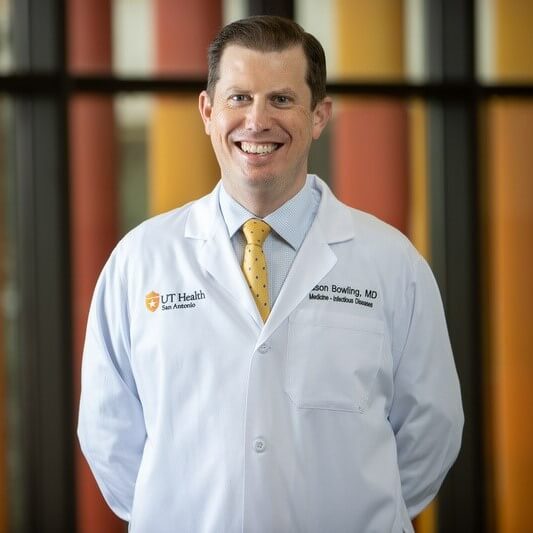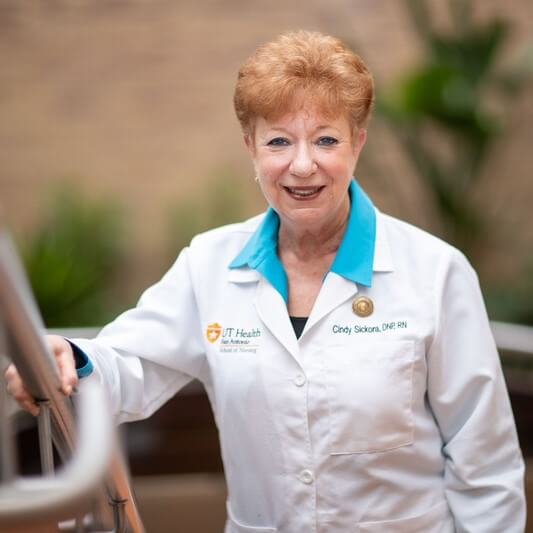
COVID-19 is still here and is not going anywhere. You and your family members can still get infected even if you are vaccinated and boosted, says Jason Bowling, MD, UT Health San Antonio infectious disease specialist.
The good news: “This current surge is not as disruptive in that we are still seeing a relatively lower number of severe cases and hospitalizations locally and nationally, even though more people are testing positive,” says Bowling.
Since COVID first emerged in the United States in early 2020 there has been a sizable increase in activity each year during summer months, notes Bowling. “What we currently are experiencing is what I call a ‘stealth surge’ brought on by more contagious subvariants of the disease.”

Now that we have a growing number of subvariants that are more transmissible but not as severe, the rate of hospitalizations or deaths may not be as helpful a metric for indicating the prevalence of COVID within our communities, says Bowling. Also making it difficult to get an accurate count on infection rates is the fact that more people are testing with at-home antigen tests. “Positivity rates could be significantly higher because some are likely not reporting a positive test, especially if they are asymptomatic or their symptoms are mild or short-lived,” he says.
So, how can individuals and families ensure the virus does not stop their summer travel plans or limit gatherings with relatives and friends? The take-home messages remain the same, says Bowling. Namely, getting vaccinated and boosted. It is the best insurance against infection and can minimize the severity of any symptoms if you do get infected, he says. And there is still a role for masking.
Masking still makes sense
While everyone is tired of taking certain precautions, consider masking the same as other safeguards you might take during your summer vacation, like wearing sunscreen to protect you from sunburn, suggests Bowling. “Your level of precaution may depend on your vacation plans. If you are staying in your personal vehicle and family bubble or spending time outside, this may not be necessary, but for air travel and other public transit, wearing a well-fitting mask makes good sense.”
Bottom line, consider where you are going, how you are getting there, what you are doing and with whom you are travelling, adds Bowling. The Centers for Disease Control and Prevention (CDC) provides a COVID data tracker that allows you to monitor by county anywhere in U.S. where outbreaks may be more active or severe.
“Keep in mind that you want to get where you’re going and to have fun,” says Bowling. “You don’t want to travel all that way and then be sick with COVID so that you can’t enjoy your vacation.”
Young kids and COVID
Parents of the youngest age category — 6 months to 5 years of age — have had a long wait for the COVID vaccine, notes Tess Barton, MD, pediatrician and pediatric immunology specialist. Now with CDC approval and the roll-out of COVID vaccines for this group, parents may still have many questions about how well the vaccine will work and whether it is safe.

Your pediatrician can also help determine the best schedule of vaccines and boosters for your child, says Barton. “COVID vaccines typically don’t need to be timed with other vaccines or be sufficiently separated from them, but this is another reason to check with your pediatrician first.” For instance, if your child is currently taking medication or steroids for another health issue, that might impact the effectiveness of the COVID vaccine, says Barton. “That trusted physician-parent-child relationship is crucial for getting the best information and care for your child.”
“We always recommend talking with your pediatrician first,” says Barton. “Not only is your pediatrician a trusted source of information, but he or she can discuss concerns specific to your child.” For instance, your pediatrician will know your child’s medical history and how to prevent any potential complications of getting the vaccine if your child has asthma or diabetes, notes Barton.
As with adults, vaccination against COVID does not eliminate the risk of infection, but it can significantly reduce your child’s risk for infection and reduce illness and severity of symptoms. “Often much attention is given to potential harmful side effects, but through the testing trials, millions of children have been vaccinated in the U.S. and worldwide and the safety profile looks very good,” says Barton. “A conversation with your pediatrician can provide reassurance about the safety profile based on the specific health condition of your child.”
A final bit of wisdom: “Don’t wait until the week before school starts to schedule an appointment or else you will likely find that your pediatrician is booked,” says Barton.
Testing is still available
One certainty is that COVID testing remains an essential tool for protecting your family members and friends from unnecessary exposure. While the antigen rapid-test kits readily available for at-home use has resulted in fewer patients coming in for the PCR diagnostic tests, UT Health San Antonio continues to provide daily COVID testing and vaccines and boosters as requested, says Cindy Sickora, DNP, RN, vice dean of practice and engagement for the university’s School of Nursing.

That testing includes on-site PCR testing by appointment. The PCR test takes no more than 15 minutes, with results posted to a patient’s MyChart record, notes Sickora.
Regardless of the test method used, Dr. Sickora encourages patients to wait until at least three to five days after suspected exposure to test. “That is the best window to ensure the most accurate results, since the presence of COVID in your system may not show up immediately with either an antigen or a PCR test.” Even on the first day of any symptoms it is generally too soon to test because it may take up to three days for the virus to be present in throat and nasal passages, says Sickora.
After a positive PCR test, it is generally unnecessary to test again, since you may continue to show as positive for up to 90 days, says Sickora. The better approach to avoid spread of the infection is to ensure you are symptom free for five days following your first day of symptoms and then to mask for five days after you return to work or school or resume your regular activities.
With greater prevalence of vaccination and boosting, many who test positive with COVID are experiencing milder symptoms and may not immediately associate these symptoms with COVID, notes Sickora. “Listen to your body. You know when you feel normal and when you do not.”
Awareness is key
“Looking ahead, the biggest X factor regarding COVID remains any new variants or subvariants,” says Bowling. “Because of the complexity and changing nature of the disease there is still a fair amount of confusion, so awareness is key.”
UT Health San Antonio has been at the forefront of combatting COVID from the beginning, notes Bowling. “We have maintained our COVID task force to monitor new developments and continue to participate in national and international studies, and vaccine and other drug clinical trials. All this puts us in close connection with others across the state and country to understand best practices.”
While vaccine combinations that address COVID and influenza may not be widely available until 2023, Bowling suggests more vaccine products are forthcoming. “These are good signs that this pandemic is moving to the next stage as endemic. As things continue to evolve to put a COVID vaccine into a more regular schedule, this puts us all in a better position of learning to live with it,” says Bowling.
“We know everyone is tired of COVID. The important thing is that we maintain awareness so that we know what to do,” says Bowling. “At UT Health San Antonio, we will continue to stay on top of the latest developments and provide communication on what serves the best interests of our community.”

